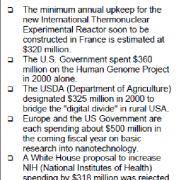RAFI and RAFI-USA Announce Plans of Name Change for Globally-focused RAFI
Enviado por ETC Staff el
Twenty-three years old, one of the world's most experienced biodiversity/biotech advocacy organizations is broadening its focus and changing its name, the directors of RAFI and of RAFI-USA announced today.
Long history: RAFI and RAFI-USA staff have been working together for over 20 years. Work on agricultural genetic resources that began under the mandate of the International Coalition for Development Action (ICDA), a Brussels-based civil society organization (CSO), in 1977 quickly merged with similar work under the auspices of the Rural Advancement Fund in the southern United States and led to the formation of the Rural Advancement Foundation International (RAFI) as a Netherlands incorporated CSO in 1985. Although the international work began to be known as RAFI, the work was still under the auspices of the Rural Advancement Fund which fully supported the work through its staffing and fundraising efforts.

